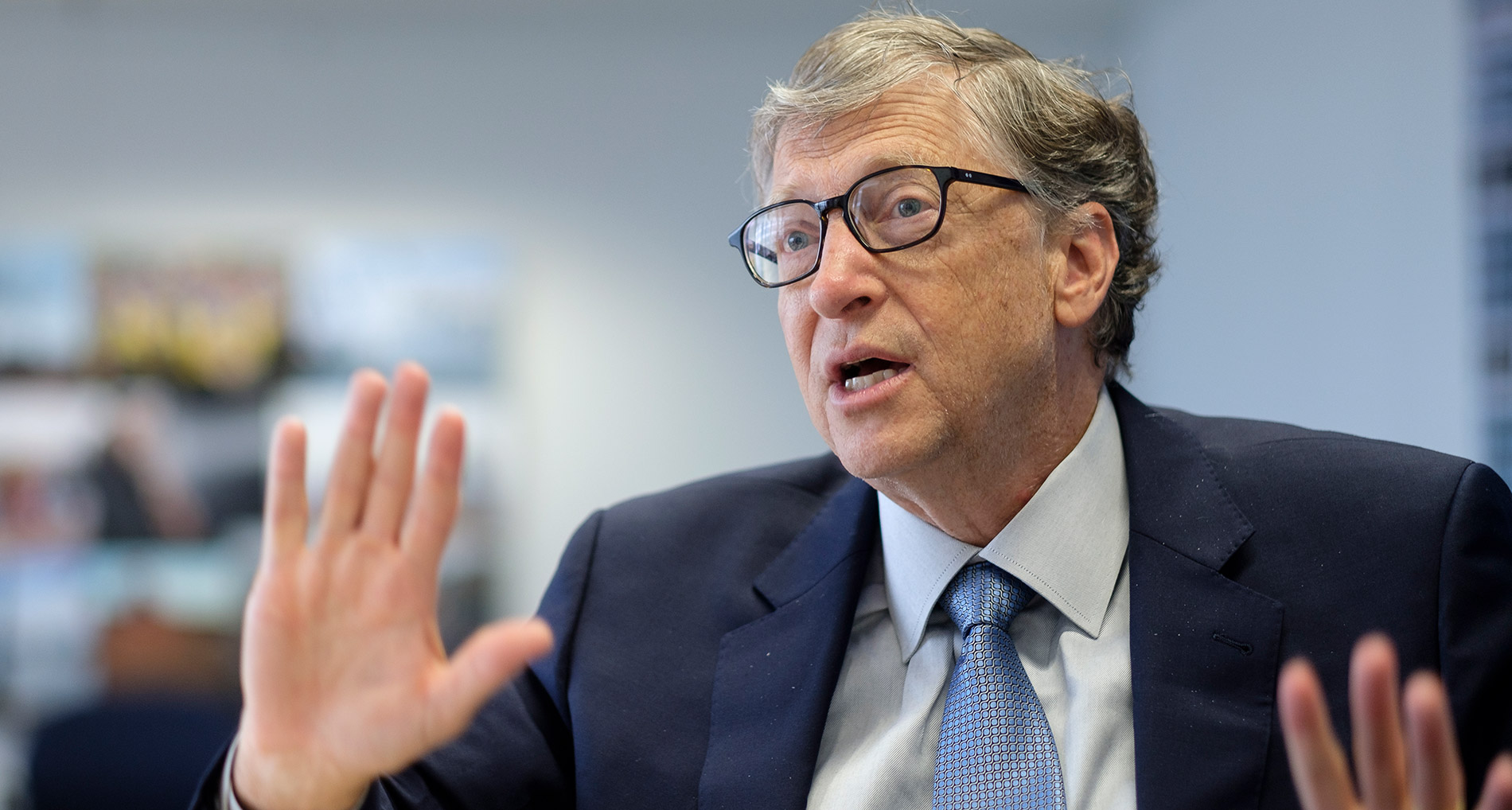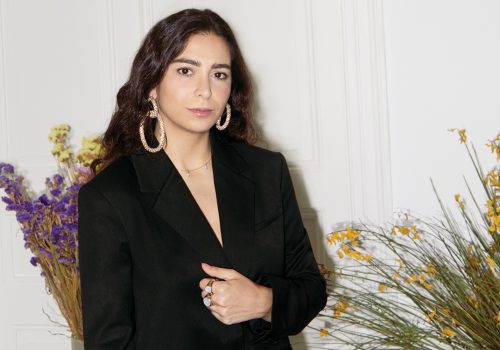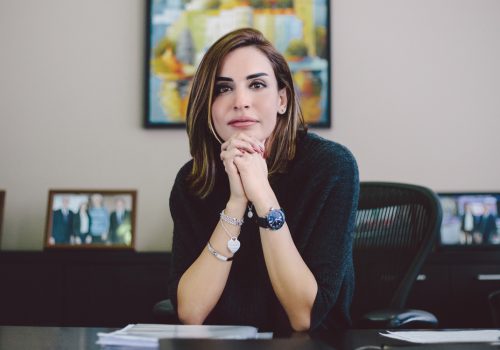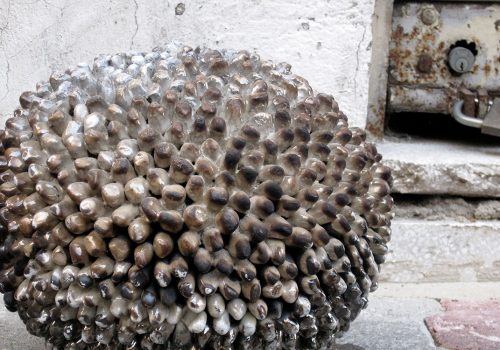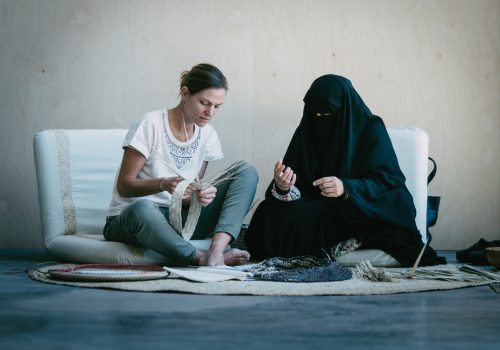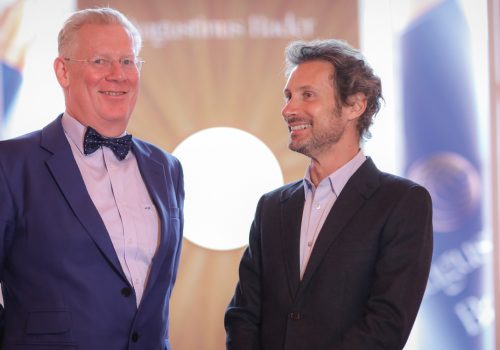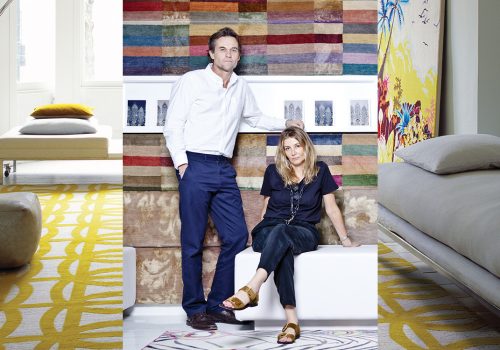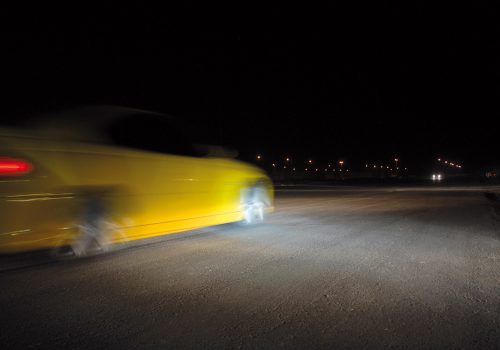Bill Gates is not wearing a seatbelt. I worry about his safety as we speed along the cleared roads of Ethiopia’s capital, Addis Ababa, flanked by military outriders, but his aides either don’t notice or know not to mention it, so I decide I shouldn’t wear one either. The goats have been cleared, the pavements swept, but Gates is not looking out of the windows. He is providing me with facts, data and population figures and explaining how many more lives he can save on this continent.
The African leaders are all meeting in Ethiopia. White Land Rovers with VVIP signs and national flags on their bonnets queue up to disgorge presidents and prime ministers covered in medals and braid. Bodyguards glare, photographers yell, the elite of the entire continent seem to be converging on the steps of the recently built African Union building. Brass bands are playing, women are dancing as 54 flags flutter in the dry heat. Then Gates arrives, an unobtrusive 63-year-old American wearing a V-neck jumper and loafers, and they rush to greet him.
Gates is the first non-political westerner invited to the African Union to give not one but two speeches and I’ve been allowed to “come along for the ride”. The second wealthiest man in the world is worth some 98 billion USD, more than several of these countries’ GDPs put together. But it’s not his charity or celebrity they are applauding; it’s his advice. He is seen as a good man in Africa, rather than some “western do-gooder” or “white saviour” who wants to assuage his guilt at his colossal good fortune. As Rwanda’s President Kagame, who is chairing the conference, says to me, “We don’t want condescending white people lecturing us on where we have gone wrong. Mr. Gates wants to fix our health and our IT – anyone would want him in their home.”
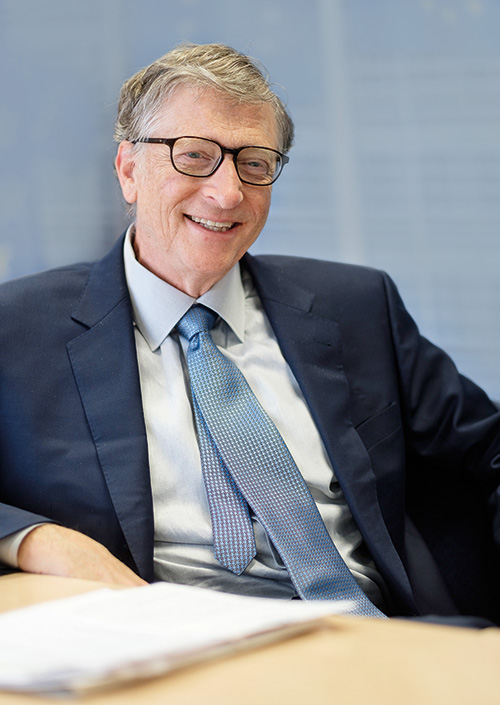
In helping pionner personal computing Gates managed to become the richest man in the world by the age of 38. But that all pales in comparison, he says, to what he’s doing now – namely, saving lives.
I had met Africa’s tech support assistant at his London HQ a week earlier to discuss the continent he first visited after he’d already made his billions from Microsoft in the 1990s. His wife of 25 years, Melinda, 54, forced him to go on a safari in Kenya when they were engaged: “I hated holidays and wasn’t that keen on animals,” he says. But they were welcomed into a Masai village where they realised the scale of difference between their West Coast tech world and the villagers’ problems.
Neither of them wanted to own a superyacht and they would soon have a perfectly decent 125 million USD house in Seattle, so the couple were determined to help. The Bill & Melinda Gates Foundation was created with the support of Gates’ billionaire friend and bridge partner, Warren Buffett, who “still pops by for dinner, do the washing-up and check how his money is being spent”. While Gates admires China for its astonishing growth rate, it’s Africa that fascinates him. “Africa is exciting because it’s the youngest continent. It has more challenges than any other continent, but it is definitely a glass half full,” he says.
Innately competitive, he can’t help acknowledging that he and Melinda may have helped to avert 10 million future deaths with their partnership with Gavi, the vaccine alliance, and save 27 million with the Global Fund, which aims to end Aids, tuberculosis and malaria. He doesn’t know if anyone has saved more, he says. But vaccines are so simple, effective and cheap, they’re addictive. “The great paradox for me was that these vaccines had been invented and children were still dying of diseases like rotavirus when we could help so easily.” The internet is not going to save the world, he believes, nor are driverless cars or tourist trips to space, “but eradicating disease just might”, which is why he has refocused his life.
It’s hard to criticise him for it. He’s tricky to interview because he’s so obviously doing the right thing, giving not only his wealth but his time to saving lives, so it seems mean-spirited to highlight any minor flaws, and I suspect he isn’t used to anyone pointing them out. You could say he is too dry and analytical, but I suspect he’s trying not to sound too arrogant.
PHILANTHROPY IS MORE STIMULATING THAN A HOLIDAY. IT’S NOT JUST FULFILLING, IT’S INTERESTING. I AM LUCKY I HAVE HAD TWO CAREERS. THE FACT THAT THIS IS NOT A PROFIT, MARKET-SHARE-DRIVEN THING, THAT MAKES IT A LITTLE MORE RELAXING.
He knows he doesn’t need to show off his wealth; only Amazon’s Jeff Bezos can beat him. Nor does he care too much about material possessions – he is one of the few tech billionaires who went to private school, his father was a successful lawyer and his childhood in Seattle was already comfortable before he started “messing around” with computers. He is happy using his local drive-through burger shack in Seattle to order his 7 USD burger and fries and he wears a 10 USD watch. But he can’t stop talking about Africa’s need for bouillon or stock cubes. In Davos, Switzerland, last month, while other CEOs networked and partied, he met the makers. “There is an opportunity to put micro-nutrients into bouillon cubes,” he says. “They are super heavily used in Africa, even in the poorest households, so this is a very cheap way of improving their health.”
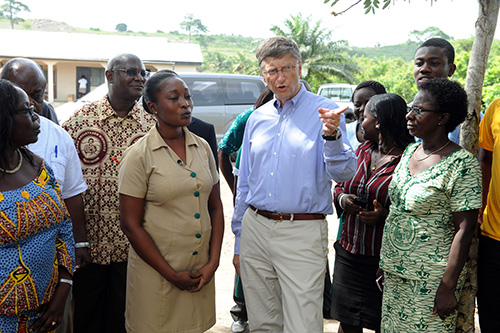 When I meet him again in Ethiopia he has had a haircut squeezed into his schedule and visited two more continents without a break. I go to two health clinics where the foundation has sponsored the drugs and vaccines and chat with the medical staff, but Gates doesn’t want the gratitude of patients, the selfies for his 47 million Twitter followers or the photoshoots with babies; he wants results, so he stays behind to work. This is a man who admits that as CEO of Microsoft, “I learnt all my employees’ license plates off by heart so I could check what time they were leaving every night.”
When I meet him again in Ethiopia he has had a haircut squeezed into his schedule and visited two more continents without a break. I go to two health clinics where the foundation has sponsored the drugs and vaccines and chat with the medical staff, but Gates doesn’t want the gratitude of patients, the selfies for his 47 million Twitter followers or the photoshoots with babies; he wants results, so he stays behind to work. This is a man who admits that as CEO of Microsoft, “I learnt all my employees’ license plates off by heart so I could check what time they were leaving every night.”
It infuriates him when the headlines from Africa are all either about pitiful orphans with huge eyes or corrupt aid projects. “The world operates in stories and, irritatingly, stories of one life saved or a tiny amount of money being spent corruptly are way better than millions of people saved. It’s way more evocative,” he says. “If I jumped in a river and grabbed a child it would be taken more seriously than the millions of lives we saved.”
His wife, Melinda, he admits, is more adept at talking in stories. When I interviewed her last year, she happily chatted about her sex life to explain the importance of contraception. Gates squirms at the idea but insists he doesn’t only think in data terms and can be affected by desperate individual cases. “If we are sitting listening to a woman who felt she had to become a sex worker to support her kids, of course I am moved.”
“Six million kids are still dying around the world before the age of five. If you want to meaningfully affect that number you can’t do it village by village or person by person. The world has the intelligence and resources to cut that six million to three million a year with vaccination programmes. It would cost less than we spend on dog food, or baldness drugs,” he points out.
Gates is not a vain man, and I suspect he genuinely can’t understand why anyone would want to spend money on their appearance rather than a vaccine or research and education projects. We head into his first conference, where he manages to smile for three hours as they discuss health issues while I fall asleep. It’s a performance worthy of Queen Elizabeth herself but he is genuinely fascinated. Finally, we go upstairs to his briefing room – the spa and swimming pool remain unvisited. Wouldn’t he like a quick dip? “No.” Or a massage? “Definitely not.” He just wants a whiteboard, a computer and paper so he can draw me some graphs – and a can of Diet Coke.
“The Africa continent is around one billion people today and the population forecast for 2100 is four billion,” he explains. “By the end of the century, it will be home to five of the world’s largest cities. So we have to make Africa a good place to live, and fast.”
We jump in the car for a dinner where he will be seated as the guest of honour between two presidents, but the music is so loud he says he can barely hear. Desperate to go to bed after a 16-hour day, he still waits so he can have a quiet discussion with the president of South Africa, Cyril Ramaphosa. Nelson Mandela was also a friend.
It says on his schedule that he needs nine hours’ sleep – underlined. What keeps him awake at night? The thought of a pandemic, he replies presciently [this interview happened just before the emergence of the coronavirus]. “It’s been 100 years since we had a huge flu epidemic. People travel more today, so the speed of spread would be faster if you had a respiratory transmitted disease. The numbers could be horrific.”
He also worries that there is so much negativity towards governments, “citizens of nowhere” and experts and finds it illogical – the world, he believes as an obsessive optimist, is improving rapidly on almost every measurement. “I see the paradox from an objective point of view. Would you rather be a woman in the workplace now or 20 years ago? Would you rather be a gay person today or 20 years ago? I see that as progress. We will cure Alzheimer’s, we will tackle obesity and diabetes. Children already drink less. They have sex later. They have a better relationship with their parents. Teenage girls have fewer pregnancies.”
His three children, Jennifer, 22, Rory, 19, and Phoebe, 16, sometimes travel with them. “Melinda does most of the parenting; she gets each child to stay with a family. I’ve travelled with them to slums they didn’t want to go to.” Whenever they arrive at a new destination, their father expects them to learn the GDP and population. “There are some basics stats I give them and some questions. I teach them how to be observant about countries that I find interesting.”
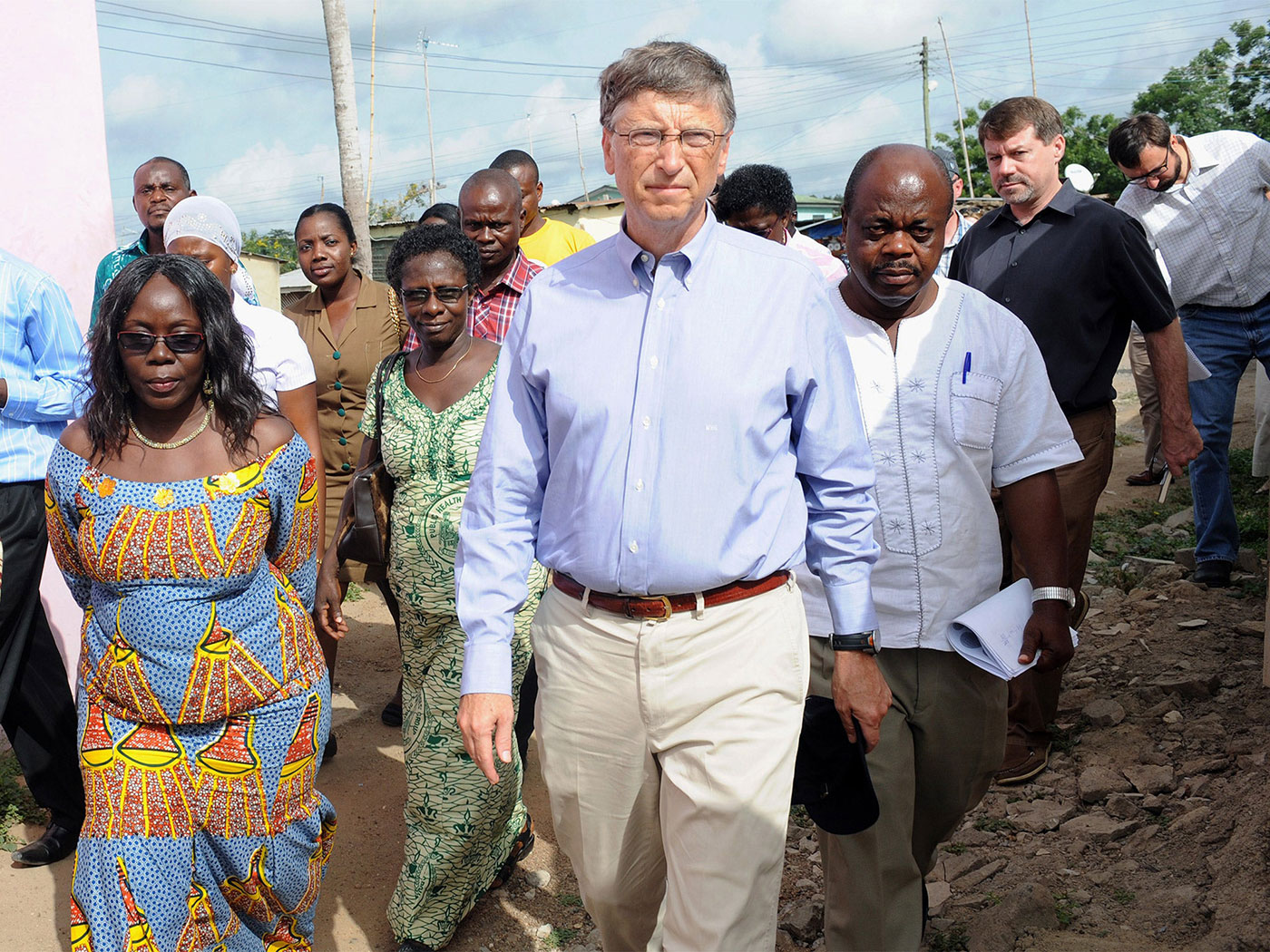
The children do, he says, realise their luck – not at their wealth, as they will only inherit 10 million USD each following their parents’ pledge to give away most of their assets – but because they have had access to education, conversations with inspirational adults and, unlike his childhood, the internet. Microsoft’s co-founder won’t condemn the online world, even as a parent. His passions at school in Seattle were computers and business magazines. He says, “I envy my children. My son can look up a court opinion online, so when he comes to the table he knows way more than I do. That’s power. My children make a playlist for me and there are benefits of social networking in terms of spreading information. It can create attacks on individuals and groups, but does that outweigh any positive benefit of families staying in touch at a distance?”
He once ran the biggest tech company in the world – he founded Microsoft with Paul Allen in 1975 – but he doesn’t miss it. “In your teens, twenties, thirties and forties, writing code personally, managing a software platform and telling the world that personal computers are the best thing that ever happened – for me, that was just perfect. I wasn’t very focused on the world at large. Then at 38 I got married and that started the process, because Melinda played a key role and we started having kids. Right now, where I get to talk to scientists and governments and go to Africa, is the most fun for me, and the best use for my unique interests and resources. So I don’t think now, I wish I was sitting there writing code and telling the other guys their code was garbage compared with mine. I’ve learnt management skills and I am a much better communicator.” I think this is code for: ‘he used to shout at his staff but now merely sends terse emails occasionally’.
Philanthropy, he insists, is fun. “It’s more stimulating than a holiday. It’s not just fulfilling, it’s interesting, going into malaria meetings and this guy saying, ‘Let’s talk vaccines, risks and possibilities.’ I am lucky I have had two careers. The fact that this is not a profit, market-share-driven thing, that makes it a little more relaxing.”
Gates only has 26 minutes before his plane is scheduled to take off and we are miles from the airport, but he appears unperturbed as we hurtle along. How does he wind down? “Melinda and I meditate most days,” he says. “Not cross-legged or anything, but on chairs next to each other.”
His family are increasingly important. Bill and Melinda have matching offices side by side in Seattle; they often read for several hours a day and watch Netflix. He helps with homework and takes his teenage children to sports competitions. Occasionally, he will drop a large sum of money on a vintage car, Leonardo da Vinci manuscript or a new ranch, but he’s mindful that this is detracting from his causes. The jet he justifies because it helps him to operate more effectively across continents.
We arrive at the private section of the airport with two minutes to spare. “It has been a good trip,” he says to me, before walking up the red carpet and straight on to the plane. The engines have already started. I realise he has barely stepped out of air-conditioned rooms and cars; he has not even felt the sun. Luggage has been delivered; his library of books is on board. He will read and sleep. None of his aides fly with him. I suspect they find him too intense and need a rest. He is alone, looking like a small geeky boy at the end of an adventure.
I return to the city centre in a car without an exhaust to catch up with President Kagame. Bill Gates, he says, has been the perfect guest and should receive a Nobel prize. “How does the world give back to such a person? He would be more comfortable just relaxing now. He has sacrificed not only his money, but his time, more holidays with his family and even his health for Africa. He looks older now, but he is a godfather to this young continent.”


